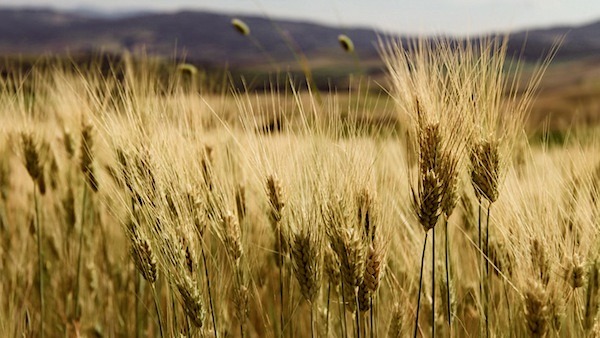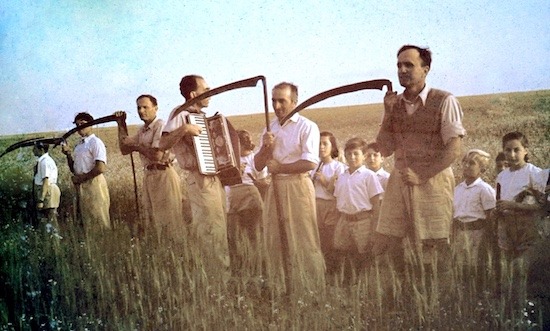Ask any Christian familiar with the Hebraic roots of their faith: what day of the week is uniquely set apart by the Hebrew Scriptures? The Sabbath, of course. All other holy days, because they are fixed by the combined lunar-solar Hebrew calendar, fall on a different day of the week each year. Or do they?

During this Holy Week, as followers of Jesus remember his last Passover meal, arrest, and crucifixion, and celebrate his resurrection on the day after the Sabbath (now called in his honor the Lord’s Day), let’s look again at what the Torah actually says about the Feast of Firstfruits which falls during the Passover week:
Speak to the children of Israel, and say to them: ‘When you come into the land which I give to you, and reap its harvest, then you shall bring a sheaf of the firstfruits of your harvest to the priest. He shall wave the sheaf before the LORD, to be accepted on your behalf; on the day after the Sabbath the priest shall wave it.’ (Lev. 23:10-11)
The Firstfruits of Those who have Fallen Asleep
Our hearts leap to realize that it was on this very day, the day after the Sabbath of Passover, that Jesus was raised from the dead, accepted on our behalf as “the firstfruits of those who have fallen asleep” in Paul’s words. And the subsequent verses in the Leviticus passage make clear that this Torah holy day on the first day of the week begins the countdown to the next major holy day, the Feast of Weeks, when the Holy Spirit was outpoured:
And you shall count for yourselves from the day after the Sabbath, from the day that you brought the sheaf of the wave offering: seven Sabbaths shall be completed. Count fifty days to the day after the seventh Sabbath; then you shall offer a new grain offering to the LORD.
So a second Torah holy day, the Feast of Weeks or Pentecost, also falls each year on the first day of the week, seven sevens or seven weeks following the resurrection on First Fruits! This is an unheard-of emphasis in the Hebrew scriptures themselves on a day of the week other than the Sabbath. The text is fairly shouting at us. Why, then, have we not heard of it?
While the intent of the text seems plain that these holy days fall on the first day of the week, rabbinic Judaism follows a tradition which claims that the “Sabbath” spoken of in Leviticus 23 actually refers to the first day of Passover, which falls on a different day each year. This is a forced and difficult reading of the text, and nowhere else in the Hebrew scriptures is “Sabbath” used in this sense.
And fascinatingly, until the time of Jesus there was no consensus on this tradition. The Sadducees, who controlled the Temple ritual, championed the straightforward reading of the text, meaning that in Jesus’ time Firstfruits and Weeks were in fact celebrated on the first day of the week. It was the Pharisees who argued against this special distinction for the first day of the week, and their view prevailed after they led the majority to reject belief in the resurrection of the Messiah on this day. Could their insistence on this point even have been part of the developing polemic against those Jews who did see Jesus’ resurrection as the fulfillment to which the Feast of Firstfruits pointed?
Notably, to this day the Karaite stream of Judaism, which rejects tradition and holds to a literal reading of the Torah, insists on celebrating the feasts of Firstfruits and Weeks on the first day of the week.
Food for thought, and praise, as we once again await the dawn of the Lord’s Day.
(This is a reflection for Holy Week by Jonathan Miles, of Shevet Achim. More about his excellent ministry here.)
~~~~~
The Problem with Changing the Date of Firstfruits
(by Lois Tverberg)
There is a problem with the rabbinic policy of interpreting the word “Sabbath” as “feast day,” in Leviticus 23:11 so that the counting of the Omer would always start on the next day after Passover. On that day, the first sheaf of the barley harvest was cut in the field as a firstfruits offering to God. The field could not be touched before that point, but after that the harvesting commenced in earnest. The cutting of the sheaf was an act of harvesting. Indeed, it was the formal beginning of the harvest, and it could not be done on Shabbat. That’s why the Torah specifies that they must wait until the day after the Shabbat after Passover, which would always be the first day of the week.

How can we tell that this is what’s going on? Because we find a dramatic dialog in Mishnah, Menahot 10:3 that shows us the controversy that revolved around this decision. Exactly as the sun sets, the firstfruits is reaped and on years when Passover is on Friday, the reaping occurs on the Sabbath, something strictly forbidden. Yet in this dialog, as the sun sets and Sabbath commences, they discuss how they are deliberately breaking the Sabbath by cutting the sheaf with a sickle. Despite the inherent contradiction they do their harvesting immediately upon the coming of sunset and with great pomp:
Menachot 10:3 D. And all the villagers nearby gather together there [on the night after the first day of Passover], so that it will be reaped with great pomp.
I E. Once it gets dark [on the night of the sixteenth of Nisan], he says to them, “Has the sun set?”
- They say, “Yes.”
- “Has the sun set?”
- They say, “Yes.”
II I. “[With] this sickle?”
- They say, “Yes.”
- “[With] this sickle?”
- They say, “Yes.”
III M. “[With] this basket?”
- They say, “Yes.”
- “[With] this basket?”
- They say, “Yes.”
IV Q. On the Sabbath, he says to them, “[Shall I reap on] this Sabbath?”
- They say, “Yes.”
- “[Shall I reap on] this Sabbath?”
- They say, “Yes.”
V U. “Shall I reap?”
- They say, “Reap.”
- “Shall I reap?”
- They say, “Reap”—
- three times for each and every matter.
- And they say to him, “Yes, yes, yes.”
- All of this [pomp] for what purpose?
- Because of the Boethusians, for they maintain, “The reaping of the [barley for] the omer is not [done] at the conclusion of the festival.”
At the conclusion of the ceremony, they say that the reason why they do this is for the sake of the “Boethusians” which is commonly assumed to be the Sadducees, who disagreed with them about how to read that text. (The Essenes, Samaritans and later Karaites opposed them too – pretty much anyone else who read Leviticus 23:11.)
It seems odd to deliberately break the Sabbath only for the reason to prove how wrong another group is that disagrees with you, doesn’t it? There is another possible answer. It’s clear that some kind of heresy is motivating them. Occasionally we see one heretical group’s name substituted for another in rabbinic texts. Were Christians the cause of their anger? While the Sadducees might have opposed the change, the Christians may have actually been the heretical group that inspired this calendar shift, which occurred after the death of Christ but before 70 AD.
As a result of the Pharisaic/rabbinic change of dating of Shavuot, the holiday would seldom fall on Yom HaRishon (Sunday, the first day of the week). Otherwise, it will always fall there. So before they decided to make this change, two major holidays commanded by the Torah always occurred on Sunday, the first day of the week. But those two days were major celebrations for the Christians, the Resurrection and Pentecost.
Personally, I suspect that the real reason for moving the festival is because the early Christians were celebrating the Resurrection of Jesus on the day of Firstfruits (Omer), and the outpouring of God’s Spirit on Shavuot. As much as Christians are criticized for moving Easter away from Passover to cut themselves free of their Jewish roots, it seems that the rabbis were doing the same thing, only in reverse.
~~~~~
An excellent article on the biblical roots and Jewish context of Pentecost is by Moshe Weinfeld, “Pentecost of Festival of the Giving of the Law.”
David Evans says
Loved this article (and the whole webiste!) and especially about the The first Fruits on the the day after the Sabbath and the tie into the Resurrection . I just have a little confusion about what we are calling the Lord’s Day. I have always thought the Sabbath was called the Lord’s (YHWH’s) day, and that in Revelation (only passage I know with that exact phrasing) John was referring to the Sabbath?
Isa 58:13
“If, because of the Sabbath, you restrain your foot From doing as you wish on My holy day, And call the Sabbath a pleasure, and the holy day of YHWH honorable, And honor it, desisting from your own ways, From seeking your own pleasure And speaking your own word, Then you will take delight in YHWH And I will make you ride on the heights of the earth; And I will feed you with the heritage of Jacob your father, For the mouth of YHWH has spoken.”
Rev 1:10
I was in the Spirit on the Lord’s day, and I heard behind me a loud voice like the sound of a trumpet,
Lois Tverberg says
Dear David –
There are a lot of places in the OT where the seventh day of the week is called a “sabbath to the Lord,” but it is never called the “Lord’s Day” (or “day of the Lord”) in either the OT or NT. Actually there is much talk about the “day of the Lord” in the Prophets, but this is about the future day when God will come to judge the sinners of the earth.
It’s pretty widely agreed upon by scholars that the “Lord’s Day” has always been a reference to the first day of the week, Sunday, because that was the day that Jesus was resurrected from the dead.
The early church would gather early in the morning on the Lord’s Day, Sunday, to worship, and then gather again after work (since it was a work day) for fellowship.
You also hear them gathering on Saturday evening, because the Sabbath concluded at sunset. Part of the reason why early believers met on Sunday was actually because many of them were still attending synagogue services on Shabbat, Saturday, even as late as the 4th century.
The rationale for the name “Lord’s Day” was related to the fact that in the Greco-Roman world it was customary to have a day dedicated to the worship of the king. The Romans had a “Caesar’s Day” that was modeled after the Egyptians who had a “king’s day.” The fact that God resurrected Jesus from the dead on the first day of the week was proof that he was and is Lord of Lords and King of Kings, so Sunday is the day for his worship.